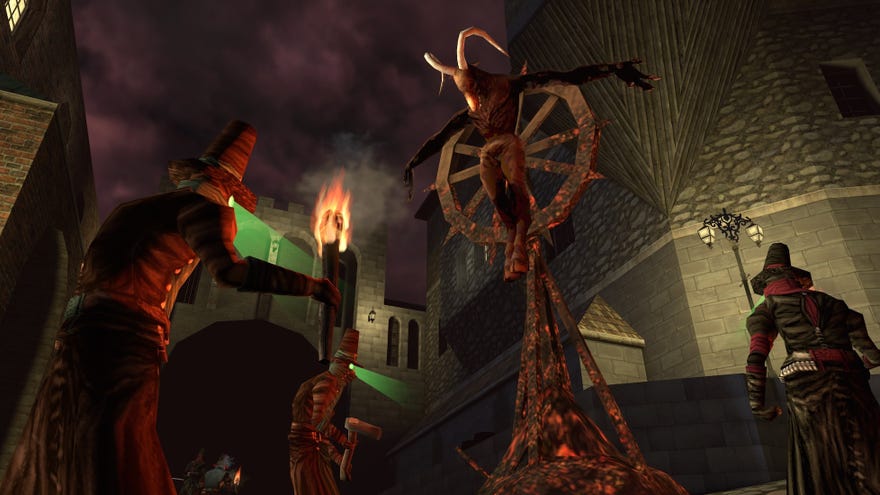Indie gaming is on the verge of an immersive sim eruption
The devs of interesting upcoming im-sims on the impending boom - and what it means for the genre
Ellis Tucci grew up playing games like Thief, System Shock, and Deus Ex. Now she's making an immersive sim of her own. It's called Spectra, and it's set in the US in an alt-history 1972 where Soviet Union is the dominant military power after President Roosevelt was deposed in a fascist coup. You play as a Soviet agent tasked with infiltrating and fomenting revolution in a fortress city called Hiwatha.
Tucci wants Spectra to meet the criteria players will expect from an immersive sim. "To me, the immersive sim is the platonic ideal of the video game" she says. "I've tried to deliver on that immersion by creating an environment that is extremely interactable and flexible in the ways it can be used." She explains that "a quite frankly silly proportion of the buildings in each map are enterable and that "you can turn off the lights, set traps, and use things like televisions, radios, or payphones as lures."
It sounds like everything immersive sim fans want. But there's one big difference between Spectra and the games that inspired it. Tucci is making it on her own. And she isn't the only indie developer working in one of the most ambitious, developmentally complex genres in the industry. Games like Shadows Of Doubt, Fallen Aces and Gloomwood are merely the steam rising from the bubbling magma chamber that is indie immersive sim development, Like the recent revival of retro shooters, the indie space is on the verge of an immersive sim eruption.

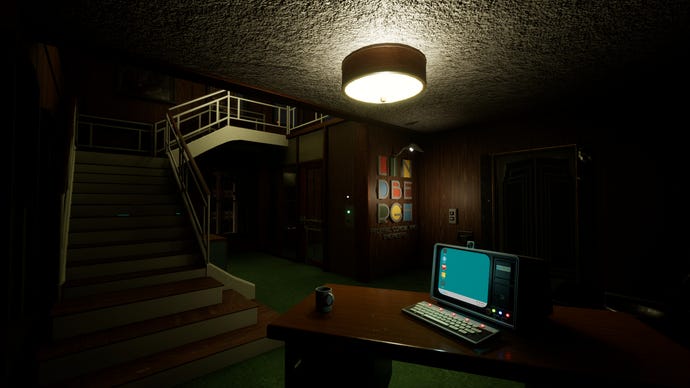
This isn't coincidental either. There's a traceable link between the revival of retro-shooters and the impending im-sim explosion, one observed by Gloomwood creator and co-director Dillon Rogers in the primordial days of the throwback FPS. "A bunch of the [New Blood] team saw the writing on the wall, knowing that people really resonated with the alpha of DUSK, and I was like, 'I bet it's going to be like when these games came out in the nineties'," Rogers says. "They're gonna be like 'Oh my god, indies can make these kinds of games now' and we're going to move onto more complicated stuff. Like who's gonna make the first pseudo Half-Life, [or] start experimenting with immersive sim mechanics?"
Much like John Romero using Quake megabucks to bankroll Deus Ex, the whole reason Gloomwood was signed by publisher New Blood was because of the success of DUSK. Rogers had shown the prototype of Gloomwood to DUSK's creator David Szymanski during the shooter's development, and was mulling pitching it to New Blood's director Dave Oshry. "David was like 'let's see how the dust settles after DUSK, and if we feel it's right, we'll pitch it to Dave'. And it was very fortunate that [DUSK] did well and New Blood could actually start looking at doing more projects."
"It's the video game genre [equivalent] of the Ring videotape. You make an immersive sim, and then you die several years later."
The way history has repeated itself is uncanny, but it's also a little portentous. Commercially speaking, immersive sims don't share the same track record for success that shooters do. "It's the video game genre [equivalent] of the Ring videotape," Rogers says. "You make an immersive sim, and then you die several years later."
Immersive sims are also substantially harder to develop than shooters, something New Blood has an acute understanding of. "David has talked about the way he designed levels for DUSK", Rogers says. "He could knock out a level pretty darn quick, especially near the end because there were deadlines, so he was like 'I have to knock out a level every couple of days.' We could not do that. It takes us as least three to four months to make a single level." This is partly because those levels need to be coherent believable spaces with numerous avenues of approach, but it's also because all the mechanics underpinning the level are interlinked. "I've talked to everyone making an immersive sim, and I've heard the same story from everyone. The moment you continue to make the game and one system changes, it reverberates out and starts affecting all these other systems."
At a time when independent developers are making all manner of games, the idea of indies tackling the immersive sim remains slightly preposterous. So how is it possible with a team of three, two, or even as a solo dev? Tucci points out that both the tools and knowledge needed to make such games are far more readily available than they were even a few years ago. "I do all my modelling, texturing, and animating in Blender, which I learned from YouTube videos. I make Spectra in Unreal Engine, which I also learned from YouTube, and since I'm a really visual learner, I've been able to use Unreal Blueprints, their built-in node based visual scripting system."
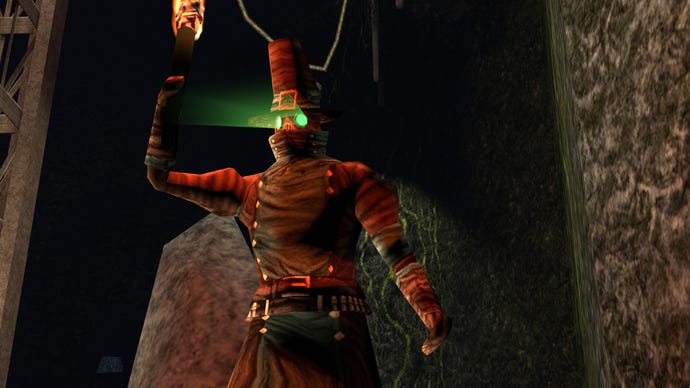
Rogers, meanwhile, points out that indies aren't obligated to compete in the graphical arms race that big-budget im-sims like Dishonored and Deus Ex are. "There was this quote from Raph[ael Colantonio] where one of the most frustrating things about working at Arkane was that they had to put so much time and effort making sure everything looked fine," Rogers says. "That rubs against immersive sims really badly, because the thing about immersive sims is that you want to offer a lot of different options. And some of those options are going to look weird because some of them aren't going to be intended."
Making immersive sims outside of traditional game development isn't just about mitigating problems, of course. There are outright advantages too, namely that it lets developers create experiences that would never get past a AAA publisher. One such project is ETOS, a "pacifist immersive sim" that sees you trying to escape from a subterranean city on a remote desert planet.
"My main inspiration for starting this project, like I'd assume many others, was hearing about Warren Spector's one [city] block," says ETOS's creator, who goes by Mab. "As the project took shape that became less of a priority and ended up with me essentially challenging myself to find common issues I found in titles in the genre, with the major one being how many games in the series tout pacifism as the morally correct way to play the game, yet pursuing it is often tied to ghost stealth, an overreliance on save scumming, and the smallest slice of the game's sandbox."
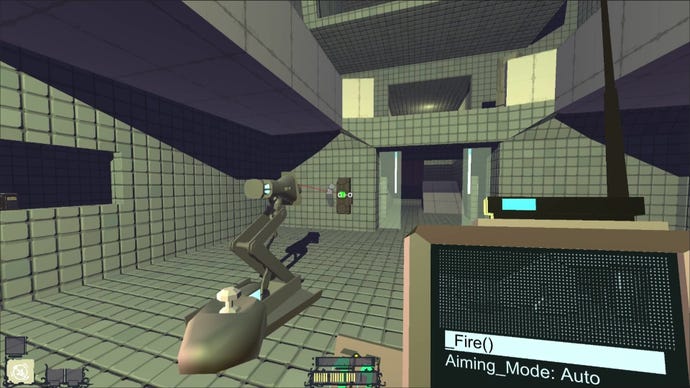
By making pacifism mandatory rather than optional, it forces Mab to think about how to make that experience mechanically satisfying. This has resulted in a toolset that focusses on enemy and environmental manipulation rather than violence. Some of these are familiar im-sim concepts, like hacking tools and a "boltcaster" that shoots smoke, flash and noise arrows to distract enemies. But there are more unusual tools too, such as a magnet gun "that lets you push and pull magnetic objects toward you, or yourself to bigger metal objects" and a deployable laser tripwire that can be connected to other deployable items so they're triggered remotely.
ETOS's pacifist angle also lets Mab explore the world narratively in a way other immersive sims can't. "I can write characters to be vital to the story, since the player can't decide to kill off anyone they choose. This [includes] enemies, and I will be exploring the long term relationships you build with the guards who are trying to keep you from stealing stuff."
The other advantage indie immersive sims bring is much simpler, new perspectives. For most of the genre's existence, immersive sims have been driven by just a handful of designers, nearly all of whom either emerged from or are in some way connected to the Origin Systems/Looking Glass binary. But with this new generation of game designers, that's changing. One such example is Peripeteia, an immersive sim hailing from Poland. Inspired mainly by games like System Shock and Deus Ex, Peripeteia has many influences typical of the genre, including cyberpunk and anime, and explores familiar themes. "I want to immerse the player in a world of propaganda and perspective," says Snake, one of the games two leads. "A place where belief, ideology, and demons of the past meet in a cyber future." But this is filtered through Poland's unique history. "The game will in places explore elements of Polish culture of the 19th and 20th Century," says the game's programming lead Shodanon, including "Polish messianism, the work of Polish modernists, the anti-communist movements".
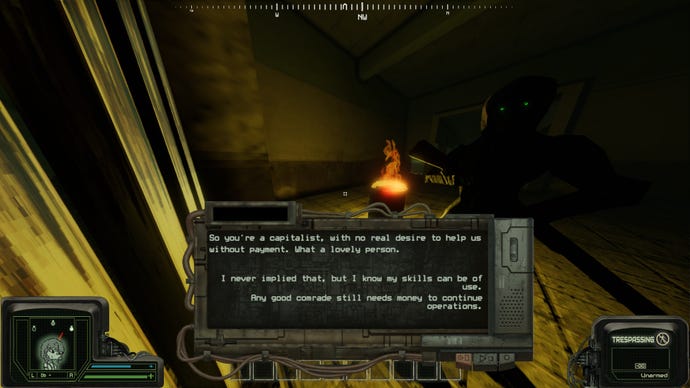
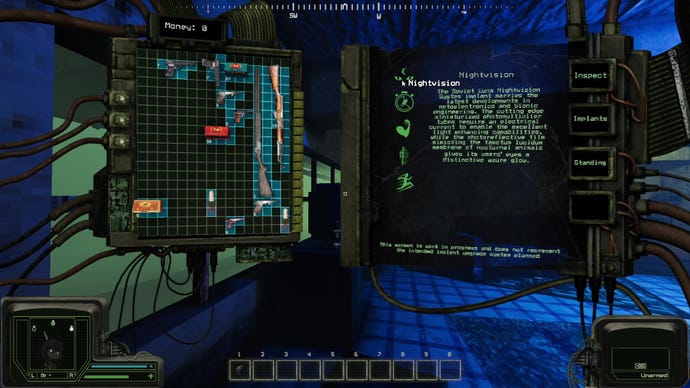
This isn't to say these games are each being made in their own bubble. The indie im-sim scene is highly interconnected, driven by the same fundamental ideals, contending with the same problems, and coping with the same anxieties. Shodanon, for example, credits Rogers for being "invaluable in signal boosting small devs" and mentions that the Peripeteia discord has itself "become a hub for everyone to discuss and promote their projects." Tucci, meanwhile, sings the praises of numerous other im-sim projects, including the "astounding" Ctrl Alt Ego, which, unlike the projects mentioned, is finished and available to play in full.
Nonetheless, the range of projects currently in development highlights where the indie im-sim revival diverges from the retro-shooter craze. Whereas the latter was about bringing back a certain type of shooter that competition forced AAA studios to move on from, the former is more about exploring the untapped potential within a genre that, despite its influence, remains fairly small. "Hopefully by the time they start releasing we can begin to agree on what really makes this genre tick, and allow us to let the genre evolve beyond its current form", Mab summarises. Tucci's own signoff gets to the heart of the matter. "Sometimes if you want something done, you've got to do it yourself."
